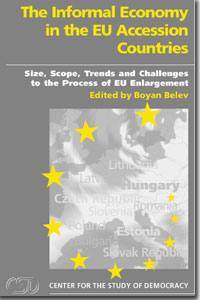The Informal Economy in the EU Accession Countries: Size, Scope, Trends and Challenges in the Process of EU Enlargement
The Informal Economy in the EU Accession Countries: Size, Scope, Trends and Challenges in the Process of EU Enlargement
Contributor(s): Boyan Belev (Editor)
Subject(s): Politics / Political Sciences, Politics, Social Sciences, Economy, Law, Constitution, Jurisprudence, National Economy, Supranational / Global Economy, Sociology, Economic policy, Applied Sociology, Evaluation research, Economic development, Socio-Economic Research
Published by: Център за изследване на демокрацията
Summary/Abstract: Twelve countries of Central and Eastern Europe are preparing for accession to the European Union.
The informal economy in these countries is a phenomenon, which may bring challenges to the process of European integration because of the insufficient knowledge about its possible implications for an enlarged union. How large is the informal economy in Central and Eastern Europe? What are its sources? In what direction is it evolving? How is it different from the informal activities in EU member states? Does it represent an obstacle to further European integration? Or maybe it can serve as a bridge between accession countries and member states?
The network "Toward European Integration", launched by the Bertelsmann Foundation and the World Bank, has brought together scholars and policy analysts from different countries in a first attempt to cooperate in finding answers to these and related questions.
- Page Count: 287
- Publication Year: 2003
- Language: English
- eBook-PDF
- Sample-PDF
- Table of Content
- Introduction

